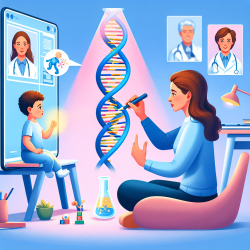Understanding MeCP2 Mutations: Implications for Online Therapy in Schools
As educators and therapists working in special education, understanding the latest research in neurological disorders can significantly enhance our practice. A recent study titled "A novel pathogenic mutation of MeCP2 impairs chromatin association independent of protein levels" by Zhou et al. provides insights that could be pivotal in shaping therapeutic approaches for students with Rett syndrome and related conditions.
The Study in Brief
The research identifies a novel mutation, G118E, in the MeCP2 protein, which plays a critical role in chromatin dynamics within neurons. This mutation, found in a young boy with Rett syndrome, diminishes MeCP2 protein levels and accelerates its nuclear mobility, thereby limiting its functional interaction with chromatin. The study utilized human neurons derived from patient iPSCs and a knock-in mouse model to establish the mutation's pathogenicity and its impact on chromatin dynamics.
Implications for Practitioners
For practitioners in the field of special education and online therapy, understanding these molecular dynamics is crucial. Here are some ways to implement these findings into practice:
- Enhanced Diagnostic Approaches: Incorporate knowledge of MeCP2 mutations in diagnostic assessments. Understanding the specific mutations can guide personalized therapeutic strategies.
- Targeted Interventions: Develop interventions that focus on enhancing chromatin interaction. This could involve cognitive exercises that stimulate neural pathways associated with MeCP2 functions.
- Research Collaboration: Engage in collaborative research efforts to explore therapeutic options that could mitigate the effects of MeCP2 mutations. This could involve partnerships with research institutions or participating in clinical trials.
- Professional Development: Stay informed about advances in genetic research related to neurological disorders. Regular training sessions and workshops can help therapists integrate new findings into their practice.
Encouraging Further Research
The study by Zhou et al. opens new avenues for research in the field of neurological disorders. Practitioners are encouraged to delve deeper into the molecular mechanisms of MeCP2 mutations and explore innovative therapeutic approaches. By leveraging high-resolution single-molecule imaging, researchers can develop targeted therapies that address the specific needs of individuals with Rett syndrome.
For those interested in exploring this research further, the original study provides a comprehensive analysis of the G118E mutation's impact on MeCP2 dynamics. Understanding these intricate details can inform the development of more effective therapies and improve outcomes for students with Rett syndrome.
To read the original research paper, please follow this link: A novel pathogenic mutation of MeCP2 impairs chromatin association independent of protein levels.










